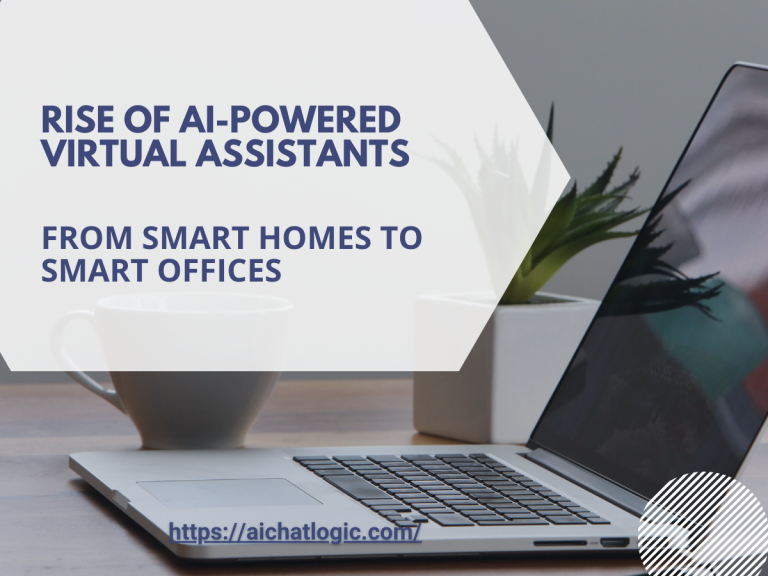1. Introduction
Artificial Intelligence (AI) assistants have become an integral part of our daily lives, transforming the way we interact with technology. From the early days of Siri to the widespread adoption of Alexa and other AI-powered assistants, the future of AI assistants holds immense potential. This article explores the evolution of AI assistants, their impact on various aspects of our lives, and provides insights into what lies ahead for these intelligent virtual helpers.
2. The Rise of AI Assistants
In recent years, AI assistants have gained significant popularity due to advancements in natural language processing, machine learning, and voice recognition technologies. These assistants are designed to understand and respond to human commands, helping users perform tasks, access information, and control devices using voice commands.
3. Understanding AI Assistants
3.1 How Do AI Assistants Work?
AI assistants rely on a combination of technologies, including natural language processing (NLP), machine learning algorithms, and cloud computing. When a user interacts with an AI assistant, their voice commands or text inputs are processed and analyzed to understand the user’s intent. The assistant then retrieves relevant information from its vast database or external sources, formulates a response, and presents it to the user in a human-like manner.
3.2 Natural Language Processing (NLP)
NLP plays a crucial role in enabling AI assistants to understand and respond to human language. It involves the ability to recognize speech patterns, interpret meaning, and generate appropriate responses. NLP algorithms utilize machine learning techniques to improve over time, becoming more accurate and proficient in understanding user inputs.
4. Evolution of AI Assistants
4.1 Siri: Apple’s Intelligent Assistant
Siri, introduced by Apple in 2011, was one of the first mainstream AI assistants to captivate the public. Initially available on iPhones, Siri allowed users to perform tasks, set reminders, send messages, and obtain information by simply speaking to their device. Over the years, Siri has evolved to support various Apple devices and has expanded its capabilities through integration with third-party apps.
4.2 Alexa: Amazon’s Voice-Controlled Assistant
Amazon’s Alexa made its debut in 2014 with the Amazon Echo smart speaker. Alexa quickly gained popularity for its ability to play music, provide weather updates, and answer questions through voice commands. With its vast ecosystem of compatible devices and a wide range of skills developed by third-party developers, Alexa has become a central hub for controlling smart homes and accessing various services.
4.3 Google Assistant: Google’s AI-Powered Helper
Google Assistant, launched in 2016, brought the power of Google’s search engine and AI technologies to the realm of AI assistants. Available on smartphones, smart speakers, and other devices, Google Assistant offers personalized recommendations, contextual information, and seamless integration with Google’s suite of services. Its advanced capabilities, combined with Google’s vast knowledge graph, make it a versatile and valuable assistant.
5. The Impact of AI Assistants
5.1 Revolutionizing Everyday Tasks
AI assistants have revolutionized the way we perform everyday tasks. From setting reminders and scheduling appointments to making online purchases and controlling smart devices, these assistants simplify and streamline various aspects of our lives. They save time and effort by providing quick access to information and executing tasks with a simple voice command.
5.2 Enhancing Productivity and Efficiency
AI assistants have proven to be valuable productivity tools, both in personal and professional settings. They can manage calendars, send emails, and provide real-time updates, allowing users to focus on more important tasks. AI assistants also offer voice-controlled automation, enabling hands-free operation and enhancing overall efficiency.
5.3 Personalized User Experiences
With the ability to learn from user interactions, AI assistants can deliver personalized experiences. They analyze user preferences, behaviors, and historical data to provide tailored recommendations, content, and services. This personalized touch enhances user satisfaction and fosters a deeper connection between users and their AI assistants.
6. AI Assistants in Smart Homes and IoT
AI assistants play a pivotal role in the rapidly expanding domain of smart homes and the Internet of Things (IoT). By integrating with various smart devices, such as thermostats, lights, and security systems, AI assistants enable voice-controlled automation and provide centralized control. Users can effortlessly manage their smart homes, create routines, and control multiple devices simultaneously.
7. The Future of AI Assistants
The future of AI assistants holds immense potential for further innovation and advancement. Here are some key areas to watch out for:
7.1 Improved Natural Language Understanding
AI assistants will continue to improve their ability to understand and respond to human language. Advancements in NLP and machine learning algorithms will enhance accuracy, context comprehension, and conversational capabilities.
7.2 Advanced Context Awareness
Future AI assistants will exhibit advanced context awareness, allowing them to understand user requests within a broader context. They will consider factors like user location, past interactions, and personal preferences to provide more accurate and contextually relevant responses.
7.3 Enhanced Emotional Intelligence
AI assistants will develop emotional intelligence, enabling them to recognize and respond to human emotions. They will understand tone, sentiment, and context, allowing for more empathetic and personalized interactions.
7.4 Seamless Integration Across Platforms
The future of AI assistants lies in seamless integration across various platforms and devices. Users will be able to interact with their assistants effortlessly, whether they are using a smartphone, smart speaker, or even augmented reality (AR) glasses.
8. FAQs about AI Assistants
8.1 What is the difference between AI assistants and chatbots?
While both AI assistants and chatbots leverage AI technologies, AI assistants are typically designed to perform a broader range of tasks and offer more sophisticated capabilities. Chatbots, on the other hand, are often focused on specific tasks, such as customer support or basic information retrieval.
8.2 Can AI assistants replace human interactions?
AI assistants can handle many routine tasks and provide information, but they are unlikely to replace human interactions entirely. They augment human interactions by automating repetitive tasks, offering recommendations, and providing quick access to information. Human interactions will remain crucial for complex and nuanced situations.
8.3 Are AI assistants a threat to privacy?
AI assistants raise privacy concerns as they gather user data to improve their performance and deliver personalized experiences. It’s important for users to understand the data collection practices of AI assistants and have control over their privacy settings. Adhering to strict data protection regulations is crucial for companies developing AI assistants.
8.4 How will AI assistants impact the job market?
While AI assistants automate certain tasks, they also create new opportunities. They can assist professionals by handling administrative tasks, freeing up time for higher-value work. The job market is likely to evolve, with a shift towards jobs that require human creativity, critical thinking, and emotional intelligence.
8.5 Can AI assistants learn and evolve over time?
Yes, AI assistants can learn and evolve over time. They employ machine learning techniques to analyze user interactions, adapt to preferences, and improve their performance. Continuous learning allows AI assistants to provide more accurate and personalized responses as they gather more data.
9. Conclusion
The future of AI assistants is bright, with ongoing advancements and innovations driving their capabilities to new heights. From Siri to Alexa and beyond, AI assistants have transformed the way we interact with technology, enhancing productivity, and simplifying our lives. As they continue to evolve, AI assistants will become even more intelligent, intuitive, and seamlessly integrated into our everyday lives, shaping a future where human and AI interactions coexist harmoniously.












+ There are no comments
Add yours